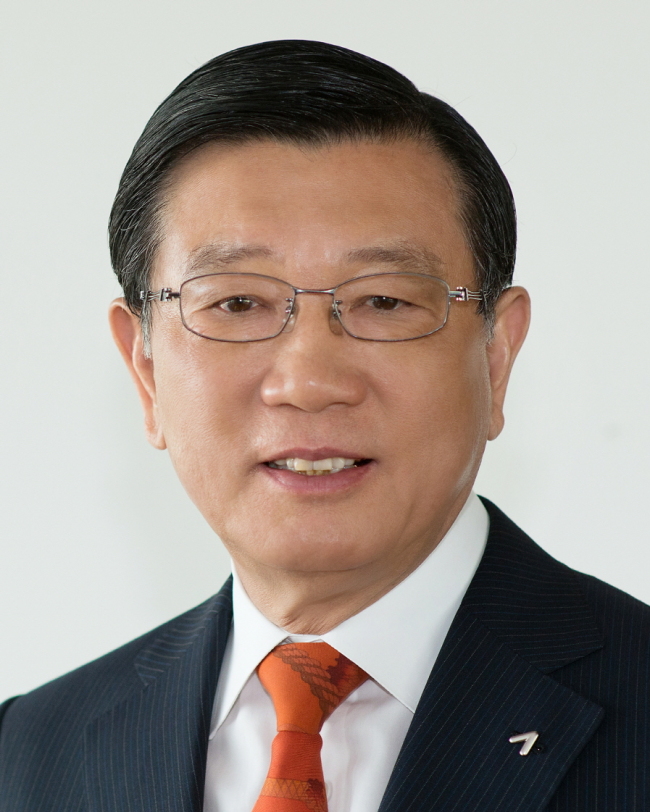Kumho Asiana Group said Monday that it would give up its buyback option for Kumho Tire if it is not allowed to form a consortium to pay for the deal.
Kumho Tire, which was separated from the group in 2010 as part of a debt restructuring deal, is poised to have its controlling stake held by creditors sold to preferred bidder Qingdao Doublestar, a tire manufacturing company listed in China.
“We cannot understand why Qingdao Doublestar is permitted to form a consortium of six companies while we are not,” said Kumho Asiana Group Chief Communications Officer Kim Se-young at a press session Monday morning.
“If we are unfairly prevented from forming a consortium, we will give up our buyback option for Kumho Tire.”
The surprise announcement came on the day that creditors of Kumho Tire, led by the Korea Development Bank, signed a stock purchase agreement with Doublestar for a 42.01 percent controlling stake in Korea’s second-largest tire company.
 |
Kumho Asiana Chairman Park Sam-koo (Kumho Asiana) |
It is the top priority of Kumho Chairman Park Sam-koo to bring the tire unit back to complete the reconstruction of the group, as he has continually stated that he is “strongly determined” to pull out all the stops.
Up to this point, Park -- who had not joined the bid through which Double Star was selected the preferred bidder in January -- had indicated that he intends to buy Kumho Tire through his own fundraising. He publicly said that he had raised 1 trillion won ($871.9 billion) in funds through financial investments in a special purpose company.
If Park gives up his buyback rights, Doublestar, which has about one-fourth the revenue of Kumho Tire, would become the 10th-largest player in the global tire market, moving up from 34th, according to news reports.
Once the sales and purchase agreement is officially delivered to Kumho Asiana, Chairman Park will have 30 days to decide whether he wants to exercise his right of first refusal. If he does, he will be able to buy the 42 percent stake at the same price submitted by Doublestar.
The buyback right was given specifically to Park and his son, Kumho Asiana Group President Park Se-chang in the original 2010 agreement.
Kumho Asiana says that this agreement does not prevent Chairman Park from creating a consortium.
At Monday’s press event, the group said that Kumho Asiana had already previously asked creditors to allow the group to form a consortium, but KDB had refused to put the matter to a vote.
“We could not make our request public, because we were told that it would be considered an active disruption of a fair bidding process and faced pressure to keep it under wraps,” said Yun Byung-chul, chief financial officer and senior vice president of Kumho Asiana.
Meanwhile, KDB said that a consortium would amount to a transfer of the right of refusal to third-party investors.
The bank argues that this type of transfer should be disallowed under the original deal without previous written permission from Kumho Tire’s creditors.
A spokesman for KDB raised question over Kumho Asiana’s timing in making the argument.
“They sent us an official request to vote on the consortium a week ago, at which point it was already decided that Doublestar would be signing the agreement,” a spokesman said. He said that Doublestar participated in the bidding with the understanding that Park would be able to exercise his right only if he could come up with the funds on his own.
“From the very beginning, Kumho Asiana had the option of giving up its right of refusal and participating in the bidding process with a consortium. By making these requests now, Kumho Asiana is asking us to change the rules in their favor, against Doublestar.”
Kumho Asiana Group confirmed again that it would technically be possible for Park and his special purpose company Kumho Invest Corp. to pay the 955 billion-won price tag without forming a consortium. But Yun said that it would be “a financial burden” to do so without strategic investors.
More importantly, Yun said, there was nothing in the original 2010 agreement that would prevent Kumho Asiana from being permitted to form a consortium, and that it was a matter of interpretation.
“I feel that the creditors are losing the big picture in favor of a literal reading of the agreement,” he said.
The KDB spokesman said that any future considerations on the matter will take place after Kumho Asiana makes its decision on whether it will exercise its right of refusal.
By Won Ho-jung (
hjwon@heraldcorp.com)








![[Today’s K-pop] Blackpink’s Jennie, Lisa invited to Coachella as solo acts](http://res.heraldm.com/phpwas/restmb_idxmake.php?idx=644&simg=/content/image/2024/11/21/20241121050099_0.jpg)